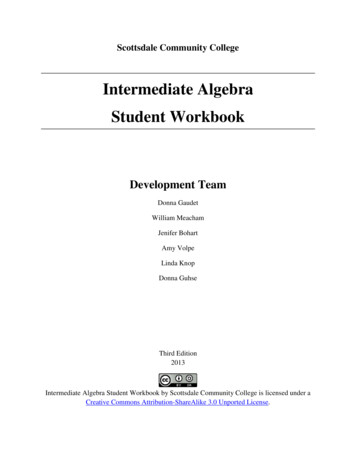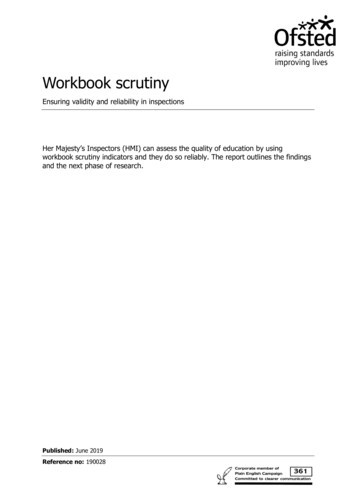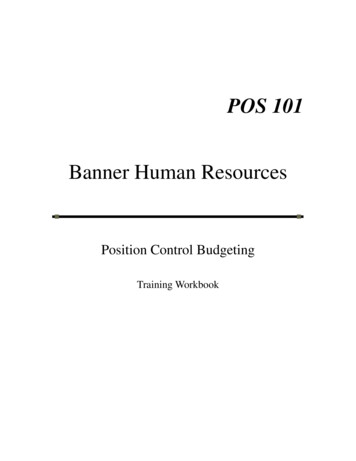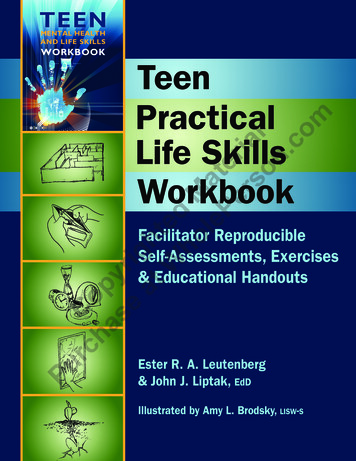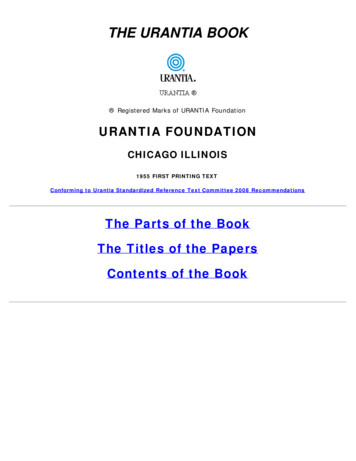
Transcription
A WORKBOOK ONLIFE IN CHRISTDisciplines ofthe SpiritMaxie Dunnam
This page intentionally left blank
A WORKBOOK ONLIFE IN CHRISTDisciplines ofthe SpiritMaxie Dunnam
Copyright 2021 Maxie DunnamAll rights reserved. No part of this publication may be reproduced, stored in a retrieval system,or transmitted, in any form or by any means—electronic, mechanical, photocopying, recording, or otherwise—without prior written permission, except for brief quotations in critical reviews or articles.Unless otherwise noted, Scriptures are taken from the Holy Bible, New International Version , NIV Copyright 1973, 1978, 1984, 2011 by Biblica, Inc. Used by permission of Zondervan. All rights reserved worldwide. www.zondervan.com The “NIV” and “New International Version” are trademarks registered inthe United States Patent and Trademark Office by Biblica, Inc. All rights reserved worldwide.Scripture quotations marked NRSV are taken from New Revised Standard Version Bible, copyright 1989 the Division of ChristianEducation of the National Council of the Churches of Christ in the United States of America. Used by permission. All rights reserved.Scripture quotations marked RSV are taken from the Revised Standard Version of the Bible, c opyright 1946, 1952, and 1971 the Division of Christian Education of the National Council of the Churchesof Christ in the United States of America. Used by permission. All rights reserved.Scripture quotations marked PHILLIPS are taken from The New Testament in Modern English by J.B. Phillips copyright 1960, 1972 J. B. Phillips. Administered by The Archbishops’ Council of the Church of England. Used by Permission.Scripture quotations marked KJV are taken from the Holy Bible, King James Version, Cambridge, 1796.Scripture quotations marked NLT are taken from the Holy Bible, New Living Translation, copyright 1996, 2004, 2015 by Tyndale House Foundation. Used by permission of Tyndale House Publishers,a Division of Tyndale House Ministries, Carol Stream, Illinois 60188. All rights reserved.Scripture quotations marked ESV are taken from the ESV Bible (The Holy Bible, English Standard Version ), copyright 2001 by Crossway, a publishing ministry of Good News Publishers. Used by permission. All rights reserved.Printed in the United States of AmericaCover design by Strange Last NamePage design by PerfecType, Nashville, TennesseeDunnam, Maxie D.Disciplines of the Spirit : a workbook on life in Christ / Maxie Dunnam. – Franklin, Tennessee : SeedbedPublishing, 2021.pages ; cm. 1 videodiscISBN 9781628248371ISBN 9781628248579ISBN 9781628248388ISBN 9781628248395ISBN 9781628248401(paperback)(DVD)(Mobi)(ePub)(uPDF)1. Spiritual life--Christianity. 2. Devotional exercises.3. Spiritual formation. 4. Christian life--Methodist authors. I. Title.BV4501.3.D8662021248/.34
CONTENTSIntroduction. . . . . . . . . . . . . . . . . . . . . . . . . . . . . . . . . . . . . . . . . . . . . . . . . . . . . . . . . . . . . . . . . . . ixWeek One: Going on to SalvationDay One: Salvation Is More Than a One-Time Event . . . . . . . . . . . . . . . . . . . . . . . . . . . . . . . . . . . 5Day Two: Salvation Began at the Beginning. . . . . . . . . . . . . . . . . . . . . . . . . . . . . . . . . . . . . . . . . . . . 8Day Three: Assurance. . . . . . . . . . . . . . . . . . . . . . . . . . . . . . . . . . . . . . . . . . . . . . . . . . . . . . . . . . . 12Day Four: Work Out in Fact What Is True in Principle. . . . . . . . . . . . . . . . . . . . . . . . . . . . . . . 15Day Five: Saved to the Uttermost. . . . . . . . . . . . . . . . . . . . . . . . . . . . . . . . . . . . . . . . . . . . . . . . . 18Day Six: We Grow by Discipline . . . . . . . . . . . . . . . . . . . . . . . . . . . . . . . . . . . . . . . . . . . . . . . . . . . . . 21Day Seven: A Price for Everything. . . . . . . . . . . . . . . . . . . . . . . . . . . . . . . . . . . . . . . . . . . . . . . . . . . 24Week One Group Sharing. . . . . . . . . . . . . . . . . . . . . . . . . . . . . . . . . . . . . . . . . . . . . . . . . . . . . . . . . . . . 27Week Two: Walking in the Ways of GodDay One: Discipline and Discipleship. . . . . . . . . . . . . . . . . . . . . . . . . . . . . . . . . . . . . . . . . . . . . . . . . 33Day Two: Heart-Work. . . . . . . . . . . . . . . . . . . . . . . . . . . . . . . . . . . . . . . . . . . . . . . . . . . . . . . . . . . . . . . . 35Day Three: Children of the Day . . . . . . . . . . . . . . . . . . . . . . . . . . . . . . . . . . . . . . . . . . . . . . . . . . . . . . 38Day Four: Dead to Sin . . . . . . . . . . . . . . . . . . . . . . . . . . . . . . . . . . . . . . . . . . . . . . . . . . . . . . . . . . . . . . . 41Day Five: Obedience in Love . . . . . . . . . . . . . . . . . . . . . . . . . . . . . . . . . . . . . . . . . . . . . . . . . . . . . . . . . . 44
viC on t e n t sDay Six: Pruning Time . . . . . . . . . . . . . . . . . . . . . . . . . . . . . . . . . . . . . . . . . . . . . . . . . . . . . . . . . . . . . . . 47Day Seven: Perfection in Love . . . . . . . . . . . . . . . . . . . . . . . . . . . . . . . . . . . . . . . . . . . . . . . . . . . . . . . . . 50Week Two Group Sharing . . . . . . . . . . . . . . . . . . . . . . . . . . . . . . . . . . . . . . . . . . . . . . . . . . . . . . . . . . . . 54Week Three: Growth in GraceDay One: No Quick Way to Be a Saint . . . . . . . . . . . . . . . . . . . . . . . . . . . . . . . . . . . . . . . . . . . . . . . . 59Day Two: My All in All. . . . . . . . . . . . . . . . . . . . . . . . . . . . . . . . . . . . . . . . . . . . . . . . . . . . . . . . . . . . . . . 62Day Three: We Cannot Control the Spirit . . . . . . . . . . . . . . . . . . . . . . . . . . . . . . . . . . . . . . . . . 66Day Four: Submission Is a Love Word . . . . . . . . . . . . . . . . . . . . . . . . . . . . . . . . . . . . . . . . . . . . . 70Day Five: God’s Grace and Our Efforts. . . . . . . . . . . . . . . . . . . . . . . . . . . . . . . . . . . . . . . . . . . . . . . . 74Day Six: Attention and Affirmation . . . . . . . . . . . . . . . . . . . . . . . . . . . . . . . . . . . . . . . . . . . . . . . . . . . 77Day Seven: Obedience Is Absolutely Essential . . . . . . . . . . . . . . . . . . . . . . . . . . . . . . . . . . . . . . . . . 81Week Three Group Sharing. . . . . . . . . . . . . . . . . . . . . . . . . . . . . . . . . . . . . . . . . . . . . . . . . . . . . . . . . . . 84Week Four: The Means of GraceDay One: What Are the Means of Grace?. . . . . . . . . . . . . . . . . . . . . . . . . . . . . . . . . . . . . . . . . . 89Day Two: Disciplines and Means of Grace. . . . . . . . . . . . . . . . . . . . . . . . . . . . . . . . . . . . . . . . . . . 92Day Three: Transformed by the Renewing of Your Mind. . . . . . . . . . . . . . . . . . . . . . . . . . . . . . . 95Day Four: Through God’s Breathed Word . . . . . . . . . . . . . . . . . . . . . . . . . . . . . . . . . . . . . . . . . . . . . 98Day Five: Persons of One Book . . . . . . . . . . . . . . . . . . . . . . . . . . . . . . . . . . . . . . . . . . . . . . . . . 101Day Six: More Than a Book . . . . . . . . . . . . . . . . . . . . . . . . . . . . . . . . . . . . . . . . . . . . . . . . . . . . . 105
C on t e n t sviiDay Seven: A Blueprint for Living. . . . . . . . . . . . . . . . . . . . . . . . . . . . . . . . . . . . . . . . . . . . . . . . . . 108Week Four Group Sharing. . . . . . . . . . . . . . . . . . . . . . . . . . . . . . . . . . . . . . . . . . . . . . . . . . . . . . . 111Week Five: Baptism and Holy CommunionDay One: An Outward and Visible Sign . . . . . . . . . . . . . . . . . . . . . . . . . . . . . . . . . . . . . . . . . . . 115Day Two: The Heavens Opened. . . . . . . . . . . . . . . . . . . . . . . . . . . . . . . . . . . . . . . . . . . . . . . . . . 118Day Three: Naming and Claiming. . . . . . . . . . . . . . . . . . . . . . . . . . . . . . . . . . . . . . . . . . . . . . . . . 122Day Four: Signs of Our Salvation. . . . . . . . . . . . . . . . . . . . . . . . . . . . . . . . . . . . . . . . . . . . . . . . . 125Day Five: Proclaiming the Lord’s Death. . . . . . . . . . . . . . . . . . . . . . . . . . . . . . . . . . . . . . . . . . . 128Day Six: Christ’s Presence in Holy Communion. . . . . . . . . . . . . . . . . . . . . . . . . . . . . . . . . . . . 131Day Seven: The Throne of Grace. . . . . . . . . . . . . . . . . . . . . . . . . . . . . . . . . . . . . . . . . . . . . . . . . 135Week Five Group Sharing . . . . . . . . . . . . . . . . . . . . . . . . . . . . . . . . . . . . . . . . . . . . . . . . . . . . . . 139Week Six: PrayerDay One: Prayer Is a Hunger and Thirst. . . . . . . . . . . . . . . . . . . . . . . . . . . . . . . . . . . . . . . . . . . . 145Day Two: Prayer Is Fellowship with God . . . . . . . . . . . . . . . . . . . . . . . . . . . . . . . . . . . . . . . . . . 149Day Three: We Pray to Experience God. . . . . . . . . . . . . . . . . . . . . . . . . . . . . . . . . . . . . . . . . . . 153Day Four: Naming and Being Named . . . . . . . . . . . . . . . . . . . . . . . . . . . . . . . . . . . . . . . . . . . . . 156Day Five: Naming God and Naming Ourselves. . . . . . . . . . . . . . . . . . . . . . . . . . . . . . . . . . . . . 160Day Six: Allowing God to Name Us. . . . . . . . . . . . . . . . . . . . . . . . . . . . . . . . . . . . . . . . . . . . . . . 164Day Seven: Intercessory Prayer. . . . . . . . . . . . . . . . . . . . . . . . . . . . . . . . . . . . . . . . . . . . . . . . . . . 168Week Six Group Sharing . . . . . . . . . . . . . . . . . . . . . . . . . . . . . . . . . . . . . . . . . . . . . . . . . . . . . . . 172
viiiC on t e n t sWeek Seven: Acting Our Way into ChristlikenessDay One: With Fasting Join Fervent Prayer. . . . . . . . . . . . . . . . . . . . . . . . . . . . . . . . . . . . . . . 177Day Two: Perspective on Fasting. . . . . . . . . . . . . . . . . . . . . . . . . . . . . . . . . . . . . . . . . . . . . . . . 179Day Three: Christian Conferencing. . . . . . . . . . . . . . . . . . . . . . . . . . . . . . . . . . . . . . . . . . . . . . 182Day Four: Listening in Love . . . . . . . . . . . . . . . . . . . . . . . . . . . . . . . . . . . . . . . . . . . . . . . . . . . . 185Day Five: Available in Love . . . . . . . . . . . . . . . . . . . . . . . . . . . . . . . . . . . . . . . . . . . . . . . . . . . . . 188Day Six: To Be like Jesus. . . . . . . . . . . . . . . . . . . . . . . . . . . . . . . . . . . . . . . . . . . . . . . . . . . . . . . . 191Day Seven: Servants after the Style of Jesus. . . . . . . . . . . . . . . . . . . . . . . . . . . . . . . . . . . . . . 194Week Seven Group Sharing. . . . . . . . . . . . . . . . . . . . . . . . . . . . . . . . . . . . . . . . . . . . . . . . . . . . . 198Notes. . . . . . . . . . . . . . . . . . . . . . . . . . . . . . . . . . . . . . . . . . . . . . . . . . . . . . . . . . . . . . . . . . . . . . . . . . . . 201
INTRODUCTIONPaul’s understanding of the Christian life revolved around two basic concepts:(1) justification by grace through faith; and (2) a person in Christ. We becomeChristian by being justified by grace through faith. That begins the dynamic ofour lives in Christ.“In Christ,” “in union with Christ,” and “Christ in you” are the recurring phrasesin Paul’s vocabulary. Variations of that phrase occur no less than 172 times in the NewTestament. His definition of a Christian is a person in Christ. “If anyone in in Christ, heis a new creation; the old has gone, the new has come” (2 Cor. 5:17).New Testament scholar James S. Stewart titled his monumental study of Paul, A Man inChrist. He contended that this concept of the indwelling Christ is the key that unlocks thesecrets of Paul’s soul. He concluded, “Everything that religion meant for Paul is focusedfor us in such great words as these: ‘I live, yet not I, but Christ liveth in me’ (Gal. 2:20).‘There is, therefore, now no condemnation to them which are in Christ Jesus’ (Rom. 8:11)‘He that is joined unto the Lord is one spirit’ (1 Cor. 6:17).”1We know the story of Paul’s Damascus Road experience: dramatically being struckdown by a blinding light and hearing the voice of Christ. But interestingly, we don’t hearthat story from Paul. Luke describes that experience in The Acts of the Apostles. Paultalks, rather, about the meaning of that experience and almost sings about it in exultingjoy: “I have been crucified with Christ and I no longer live, but Christ lives in me. The lifeI now live in the body, I live by faith in the Son of God, who loved me and gave himselffor me” (Gal. 2:20 NIV).This core theme of Paul—life in Christ—is the subject of this workbook. I have used myworkbook style to explore the issue. The very title, Disciplines of the Spirit: A Workbook onLife in Christ, suggests that it may require more than expressing and elaborating on ideas.Special attention is given to particular disciplines Christians call means of grace, becausethey are especially experienced as channels through which God’s grace is conveyed to us.ix
xI n t roduc t ionThey are disciplines of the Spirit, as Wesley described them: “outward signs, words andactions ordained by God, and appointed to the end to be ordinary channels whereby hemight convey to man preventing, justifying or sanctifying grace.”2I urge you to stay aware that the workbook format is important to appropriatingmeaning of the content, and our growth in our lives in Christ. It is designed for individualand group use. Let’s look at the process. It is simple but important.I have learned from my long years of teaching and ministry with small groups thata six- to eight-week period for a group study is the most manageable and effective. Also,people can best appropriate content and truth in small doses. That is the reason for organizing the material in segments to be read daily.The plan for using the workbook calls for a seven-week commitment. You are asked togive at least thirty to forty-five minutes each day to reflect on some dimension of spiritualdisciplines and the means of grace. For most persons, engagement with the workbook willprobably come at the beginning of the day. However, if it is not possible for you to give thetime at the beginning of the day, do it whenever the time is available, but do it regularly.This is not only an intellectual pursuit; it is also a spiritual journey, the purpose of whichis to incorporate the content into your daily life. This journey is personal, but my hope is thatyou will share it with some fellow pilgrims who will meet together once each week during theseven weeks of the study. The workbook is arranged into seven major divisions, each designedto guide you for one week. These divisions contain seven sections, one for each day of the week.Each day of the week will have three major aspects: (1) reading, (2) reflecting and recordingideas and thoughts about the material and your own understanding and experience, (3) somepractical suggestions for incorporating ideas from the reading material into your daily life.The content for each day will not be too much to read, but it will be enough to challenge thought and action. The degree of meaning you receive from this workbook dependslargely on your faithfulness in reflecting and recording. On some days there may be moresuggestions than you can deal with in the time you have available. Do what is most meaningful for you, and do not feel guilty about the rest.
I n t roduc t ionxiAlways remember that this pilgrimage is personal. What you write in your workbook isyour private property. You may not wish to share it with anyone. For this reason, no twopeople should attempt to share the same workbook. The importance of what you write isnot what it may mean to someone else but what it means to you. Writing, even if only briefnotes or single-word reminders, helps us clarify our feelings and thinking.The significance of the reflecting-and-recording dimension will grow as you movealong. Even beyond the seven weeks, you will find meaning in looking back to what youwrote on a particular day in response to a particular situation.Sharing with OthersThere is a sense in which this workbook can be a spiritual guide, for you can use it asa private venture without participating in a group. The value of the workbook will beenhanced, however, if you share the adventure with eight to twelve others. In this way, youwill profit from the growing insights of others, and they will profit from yours.The text includes a guide for group sharing at the end of each week. If this is a groupventure, everyone should begin their personal involvement with the book on the same day,so that when you come together to share as a group, all will have been dealing with thesame material and will be at the same place in the text. It will be helpful to have an initialget-acquainted group meeting to begin the adventure.Group sessions for this workbook are designed to last ninety minutes (with the exception of the initial meeting). Those sharing in the group should covenant to attend allsessions unless an emergency prevents attendance. There will be seven weekly sessions inaddition to this first get-acquainted time.Group Leader’s TasksOne person may provide the leadership for the entire seven weeks, or leaders may beassigned from week to week. The leader’s tasks are:
xiiI n t roduc t ion1. Read the directions and determine ahead of time how to handle the session. It may notbe possible to use all the suggestions for sharing and praying together. Feel free to selectthose you think will be most meaningful and those for which you have adequate time.2. Model a style of openness, honesty, and warmth. A leader does not ask anyone to sharewhat he or she is not willing to share. Usually, as leader, be the first to share, especiallyas it relates to personal experiences.3. Moderate the discussion.4. Encourage reluctant members to participate and try to prevent a few group membersfrom doing all the talking.5. Keep the sharing centered in personal experience rather than academic debate.6. Honor the time schedule. If it appears necessary to go longer than ninety minutes, theleader should get consensus for continuing another twenty or thirty minutes.7. See that the meeting time and place are known by all, especially if meetings are heldin different homes.8. Make sure that the necessary materials for meetings are available and that the meetingroom is arranged ahead of time.It is a good idea to hold weekly meetings in the homes of the participants. (Hosts orhostesses may make sure there are as few interruptions as possible from children, telephones, pets, and so forth.) If the meetings are held in a church, plan to be in an informalsetting. Participants are asked to dress casually, to be comfortable and relaxed. If refreshments are planned, serve them after the formal meeting. In this way, those who wish tostay longer for informal discussion may do so, while those who need to keep to the timeschedule will be free to leave, having had the full value of the meeting time.Suggestions for Initial Get-Acquainted MeetingSince the initial meeting is for the purpose of getting acquainted and beginning the sharedpilgrimage, here is a way to get started. (If name tags are needed, provide them.)
I n t roduc t ionxiii1. Have each person in the group give his or her full name and the name by which eachwishes to be called. Do away with titles. Address all persons by their first name or nickname. (Each person should make a list of the names somewhere in his/her workbook.)2. Let each person in the group share one of the happiest, most exciting, or most meaningful experiences he/she has had during the past three or four weeks. After all personshave shared in this way, let the entire group sing the doxology (“Praise God, fromWhom All Blessings Flow”) or a chorus of praise.3. After this experience of happy sharing, ask each person who will to share his/her expectations of this workbook study. Why did he or she become a part of it? What does eachexpect to gain from it? What are the reservations?4. The leader should now review the introduction to the workbook and ask if there arequestions about directions and procedures (this means that the leader should have readthe introduction prior to the meeting). If persons have not received copies of the workbook, the books should be handed out now. Remember that every person must have his/her own workbook.5. Day One in the workbook is the day following this initial meeting, and the next meetingshould be held on Day Seven of the First Week. If the group must choose anotherweekly meeting time other than seven days from this initial session, the reading assignment should be brought in harmony with that so that the weekly meetings are alwayson Day Seven, and Day One is always the day following a weekly meeting.6. Nothing binds a group together more than praying for one another. The leader shouldencourage each participant to write the names of each person in the group in his/herworkbook and commit to praying for them by name daily during these seven weeks.After checking to see that everyone knows the time and place of the next meeting, theleader may close with prayer, thanking God for each person in the group, for the opportunity for growth, and for the possibility of growing in our lives in Christ.
This page intentionally left blank
A WORKBOOK ONLIFE IN CHRISTDisciplines ofthe SpiritMaxie Dunnam
This page intentionally left blank
Week OneGoing on to Salvation
This page intentionally left blank
DAY ONESalvation Is More Thana One-Time EventThen we will no longer be infants, tossed back and forth by the waves, and blownhere and there by every wind of teaching and by the cunning and craftiness ofpeople in their deceitful scheming. Instead, speaking the truth in love, we will growto become in every respect the mature body of him who is the head, that is, Christ.From him the whole body, joined and held together by every supporting ligament,grows and builds itself up in love, as each part does its work.—Eph. 4:14–16This study’s primary focus is on the spiritual disciplines and the means of grace, thepurposes of which are spiritual growth. So we begin with looking at the nature ofsalvation. Too many see salvation as a one-time event—that moment we acknowledge ourselves as sinners, confess our sin, repent, and accept Christ as our Savior. That,however, is the beginning experience; we do not suddenly emerge as full-grown Christians.We call experiencing spiritual maturity in its fullness “going on to salvation.”John Wesley had a clear picture of what he called the “way of salvation.” Thoughhe seldom used the word conversion, he placed a strong emphasis on justification. ManyChristian thinkers do not do so, but Wesley distinguished regeneration and the new birthfrom justification. He began his sermon “The New Birth”:5
6W e e k On e , Day On eIf any doctrines within the whole compass of Christianity may be properly termedfundamental, they are doubtless these two—the doctrine of justification, and thatof the new birth: the former relating to that great work which God does for us, inforgiving our sins; the latter, to the great work which God does in us, in renewingour fallen nature.1Though distinctive, the doctrines of justification and new birth belong together. Godacts for us to forgive us, and at the same time begins the restoration of the divine imagewithin us. This is the reason the new birth is such a powerful image. As our physical birthis the momentous beginning of our physical life on earth, our new life in Christ is thebeginning of our soul’s life for spiritual growth. We are, by God’s grace, redeemed fromsin and justified in relation to him; we are born of the Spirit.Wesley defined the nature of the new birth in this fashion:It is that great change which God works in the soul when he brings it into life;when he raises it from the death of sin to the life of righteousness. It is the changewrought in the whole soul by the almighty Spirit of God when it is “created anewin Christ Jesus”; when it is “renewed after the image of God, in righteousness andtrue holiness”; when the love of the world is changed into the love of God; prideinto humility; passion into meekness; hatred, envy, malice, into a sincere, tender,disinterested love for all mankind.2Even here, in the description of these elements of salvation—justification and newbirth—there is the dynamic of growth, going on to salvation. We may be justified by gracethrough faith (see Romans 3:24; Ephesians 2:8) and be converted to Christ in the miracleof a moment, but the making of a saint, Christian maturity, is the task of a lifetime. That’sthe reason spiritual disciplines and the means of grace are essential. As Jesus talked aboutbeing “born again” (John 3:3), Paul, in his epistle to the Ephesians, calls us to no longer beinfants, but to “grow up . . . into Christ” (Eph. 4:15 RSV).
W e e k On e , Day On e7Reflecting and RecordingSpend some time reflecting on your spiritual journey. Can you recall a time when youdefinitely claimed the Christian faith and named yourself a Christian? Write a few notesabout that experience, perhaps some dates, feelings, occasions, and persons who may havebeen involved.During the DayChoose someone with whom you are comfortable sharing, tell them about this study you arebeginning, and discuss what you have thought and recorded about your spiritual journey.
DAY TWOSalvation Began at the Beginning“No one can come to me unless the Father who sent me draws them, and I willraise them up at the last day. It is written in the Prophets: ‘They will all be taughtby God.’ Everyone who has heard the Father and learned from him comes to me.”—John 6:44–45Salvation began at the beginning. The Nicene Creed, the creed most used by Christians,states this as it talks about God coming to us in Jesus Christ:For us and for our salvationhe came down from heaven;he became incarnate by the Holy Spirit and the virgin Mary,and was made human.God the Father almighty, maker of heaven and earth, loves us so much that he comesto us in Jesus Christ. We are saved by his grace. This grace is incomprehensible; in fact,theologian Karl Barth pointedly remarked in his book The Epistle to the Romans: “Onlywhen grace is recognized as incomprehensible is it grace.”3 Even so, we experience graceexpressed in different ways, and we have different ways of talking about it.In his sermon “The Scripture Way of Salvation,” John Wesley summarized the goalof genuine Christian religion: “The end is, in one word, salvation.” In its broadest sense,Wesley understood salvation as the entire redeeming work of God in a human life, “from8
W e e k On e , Day Two9the first dawning of grace in the soul, till it is consummated in glory.” He includes withinhis concept of salvation “all the drawings of the Father”—which he terms “preventinggrace”—in the heart of a person as yet uncommitted to God. 4God’s grace works in us even before justifying grace and the new birth. We call thisprevenient grace, a term describing God’s first attempts to reach us, call us, and saveus. Jesus said, “No one can come to me unless the Father who sent me draws them,and I will raise them up at the last day” (John 6:44). God always makes the first movetoward us.Grace is undeserved love; the unmerited favor God bestows. The word prevenient isa combination of two Latin root words: prae, meaning “before,” and venire, “to come.”Prevenient means that which comes first or in advance. So, prevenient grace is that firstmove God makes in our direction.Prevenient grace may be that first slight twinge of conscience, or the vague discontentor growing questioning about our lifestyle, or concern about our relationship with God.Grace is God calling our name.Later, we will discuss Scripture as one of the primary means of grace. One of theways I make this means effective in my life is to read the Bible in different translations.Consider the following passage, which is an illuminating expression of prevenient grace:For I am not ashamed of the Gospel. I see it as the very power of God working forthe salvation of everyone who believes it, both Jew and Greek. I see in it God’s planfor imparting righteousness to men, a process begun and continued by their faith.For, as the scripture says: “The just shall live by faith.” (Rom. 1:16–17 PHILLIPS)Many translations of Romans 1:16 have Paul stating simply that the gospel is “the powerof God for salvation.” Note how Phillips translates it, “the power of God working for thesalvation of everyone who believes.” C. K. Barrett, an outstanding British New Testamentscholar, has what I believe is a more meaningful translation: “For I am not ashamed of
10W e e k On e , Day Twothe Gospel, since it is the operation of God’s power working towards salvation, effective foreveryone who has faith—Jews first, and then the Gentiles too.”5This is a powerful expression of prevenient grace: “God’s power working towardssalvation, effective for everyone who has faith.” Even before God’s grace works for ourjustification and new birth, his grace is working to bring us to that point where we acknowledge our sin and begin to realize we need to be saved from our sin.Note in the Phillips and Barrett translations that salvation is presented as a process—not a dynamic of fixed steps, but that of one thing happening before another can work.What is important to recognize is that God is taking the initiative, always offering hisloving power for our full salvation.The gospel itself is the “operation of God’s power working towards salvation,” as Barretttranslates Paul. This is not merely an announcement, or a proclamation, that salvation willcome at some time in the future. God’s power is at work now; God is taking the initiative.This working of God is not dependent upon any human activity or condition; it is notbecause we have chosen, but because God wills and
Scripture quotations marked KJV are taken from the Holy Bible, King James Version, Cambridge, 1796. Scripture quotations marked NLT are taken from the Holy Bible, New Living Translation, copyright 1996, 2004, 2015 by Tyndale House Fo

